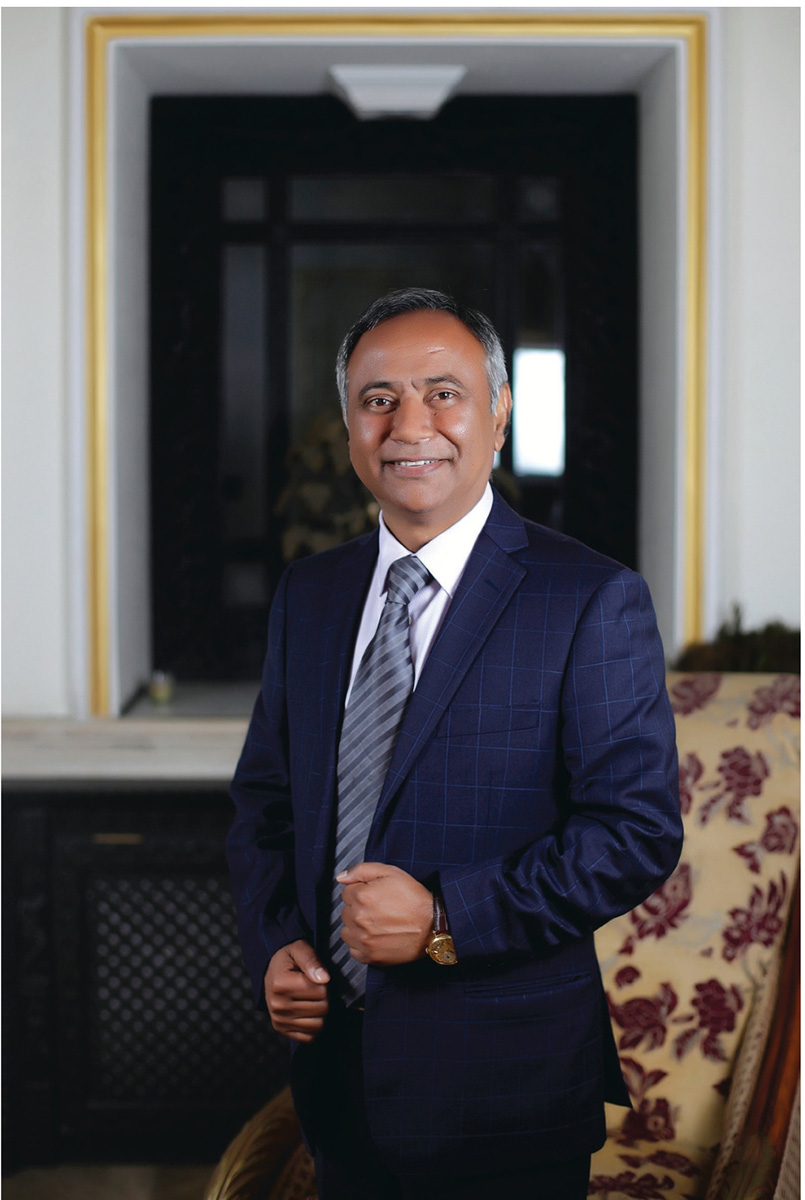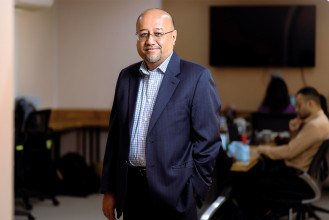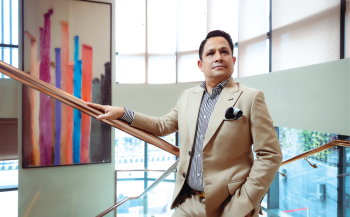
“Nation’s prosperity is far more important than any individual’s. No matter how rich I am, I get only that much respect as my country receives,” shares Dr Upendra Mahato, an international entrepreneur and one of the biggest business identities of Nepal. But Mahato prefers to call himself a philanthropist, and also wants to be recognised as a leader of economic agendas. Dr Mahato has numerous business ventures in Nepal and abroad, and is the Founder Chairman of Non-Resident Nepali Association (NRNA). He is also President of Russia-Nepal Chamber of Commerce and Industry and the Honorary Consul General of Nepal to the Republic of Belarus. In Nepal, Dr Mahato has his presence in major business sectors like telecommunication, media, banking, health, education and agriculture. He is currently laying impetus on investment in health and agriculture with the soon to open Nepal Mediciti, a world class 700 bedded multi-disciplinary specialty hospital with top-notch world-class technology and manpower. According to Mahato, Nepal Mediciti will be one of the biggest hospitals in South Asia and will provide quality healthcare at affordable price. There is an emotional and unfortunate event that led Mahato to invest in the health sector. His mother passed away from a heart attack as she couldn’t receive proper treatment in the village. “I feel for my mother, and I equally feel for all those Nepalis who are not able to receive the simplest of health services and treatment. I want to make affordable treatment accessible to every single Nepali through Nepal Mediciti,” he states. Along with making treatments affordable, Mahato also aims to enhance the level of treatment in Nepal. “I figured out that a huge amount of money is going abroad from Nepal for treatment... treatments that can be done in Nepal itself. A lot of money is wasted because people do not have trust in the health service provided in Nepal. I want to change this scenario through my new hospital,” he shares.
Early Life and Education
Mahato was born in a village named Karjanha of Siraha district in 1963 to Ramashish Mahato and late Phul Kumari Mahato. He received his secondary education in the village itself at a local school. “Growing up in a farmer family, my childhood was quite simple. Mine was a medium-class family. I worked in the fields as a kid, took cattle for grazing and took food for the workers in field. This was the life I grew up in,” he recalls. Mahato was also a very good student. “I was brilliant in mathematics and physics. I was always at the top of my class throughout my school life,” he reminisces. He aimed to become an engineer since childhood and came to Kathmandu for the first time in 1980 for higher studies joining IE in Civil Engineering at Pulchowk Engineering College. On completing the course, he worked for a year as an overseer in an irrigation project in Biratnagar. In 1982, Mahato received a scholarship to study in Russia, then the Soviet Union. He finished his Masters in Engineering in Hydropower from Belarusian State Polytechnic Academy in Minsk with distinction with Honors and in first position in the faculty. After that, Mahato did his Ph D and D Sc in Soil Mechanics from the International Academy of Information Technology in Minsk. Mahato is the first Nepali to complete D Sc in a technical subject.
Life in Russia
In 1990, Russia introduced a new economic policy that allowed foreigners to work and live in Russia. Prior to that, foreigners were not allowed to work or own a business in Russia. Taking advantage of the new policy, Mahato thought of making some money as his stipend was insufficient. He started by purchasing electronic devices from Germany and Singapore and selling it in Russia, a venture initiated with 600 US Dollars. From the profits he generated, he was able to start a company named Syntez Pvt Ltd in Belarus. The company purchased crude oil from Russia, refined it in Belarus and sold it in many European countries. This was the first registered business Mahato opened. He was also the first foreigner in Belarus to start such a company. “I used to stay more in Belarus, but had my businesses in Moscow owing to the population and the demand there,” he says. During the same time, Mahato purchased a TV factory in Moscow that was about to shut down. He also opened an electronics supermarket in Moscow named Gorbushka Supermarket. With more than 1,800 shops, it still is one of the biggest electronics supermarkets in all of Europe. Mahato further expanded his business and started a fashion and sports mall in Moscow. He also purchased a factory in Belarus named Amkodor that produces heavy equipments. His business even expanded to real estate and construction in Russia.
NRNA Establishment
Mahato had become a well known businessman in Russia, and his businesses were doing very well. He needed to travel frequently for business deals and other purposes. “While travelling the world, I was very disheartened by the status of the Nepali passport. We were looked down upon by all developed countries. We had to face a lot of hassle in immigration and the treatment towards a Nepali Passport holder was generally bad. Travelling was very difficult for a Nepali passport holder,” shares Mahato. Having lived in the Soviet Union, Mahato learnt about social security, equality and the nationalist notion that existed there. He felt that Nepalis residing outside Nepal need to have a responsibility towards Nepal too. With this feeling, Dr Mahato established Non-Resident Nepalese Association (NRNA) in 2003 to provide a common platform for the Nepali Diaspora. “I founded NRNA with the objective of helping Nepal in its development process through the help of NRNs, and also to establish a feeling of nationality in the Nepali diaspora,” he says. According to him, NRNA encompasses all strata of Nepalis living abroad, from workers to businessmen and all in between. NRNA also attempts to address the problems of more than six million Nepalis living abroad. After establishing NRNA, Mahato started coming to Nepal frequently and became a familiar name here. He also got the opportunity to know and talk with politicians, leaders and media, and today is a household name.
Investments in Nepal
After starting NRNA, Dr Mahato wanted to make investments in Nepal, but not just for the sake of investing. He wasn’t opting for haphazard investment; he wanted to invest in those areas that were promising, had long term benefits and that would significantly advance the agenda of national development. “This is the reason why I chose the telecommunication sector as it is one of the drivers of a nation. I started Mero Mobile (now Ncell) to provide telecom services in Nepal,” he shares. This was Mahato’s first investment in Nepal. After that, he invested in numerous sectors and institutions in Nepal, Kantipur Television Networks, Tamor Sanima Energy, Sanima Hydro and Engineering, Machhapuchchhre Bank, Ashwins Medical College and Hospital, Grande International Hospital, Medicare National Hospital And Research Centre, Kantipur Engineering College and Acme Engineering College to name just a few. Dr Mahato is a major shareholder in all of these.
Philanthropy
Apart from business, Dr Mahato established Phul Kumari Mahato Memorial Trust in 2004 in memory of his mother for social and charitable works. According to Mahato, the objective of the Trust is to help promote livelihood of the poor and marginalised by assisting them in their efforts of employment generation; offering healthcare, education and other opportunities. ‘Community Development through Philanthropy’ is the slogan of the Trust. Phul Kumari Mahato Memorial Hospital in Siraha, a Kriyaputri Bhawan (funeral rites house) in Pashupatinath, Phul Kumari Mahato National Higher Secondary School in Siraha, and Foreign Employment Relief Fund are some of Mahatos philanthropic undertakings. Mahato’s recent non-profit venture Patanjali Ayurved has a factory in Bara district and produces herbal-based fast moving consumer goods (FMCG). Acharya Balkrishna of Patanjali Yogpith is the Chairman of the company and Dr Samata Prasad, spouse of Dr Upendra Mahato is a board member. Both stakeolders have decided to spend all profits from this venture on charitable and social works in Nepal. Mahato strongly believes that able members of the society must give back to the community in any way they can. “It is the only thing that gives you satisfaction in the end,” he opines. He also believes that only a strong person can help others. “You have to be capable of helping. Your own development should be the first priority, only then you can help others,” he remarks.
Focus on Nepal
Dr Mahato holds that the implementation of laws and policies is one of weakest aspects of our country, and is a major impediment to national development. According to him, Nepal has good policies and a lot of policy makers, but what it lacks is a strong national leadership than can implement these laws and policies. “Political instability and corruption are other culprits, but the biggest problem in Nepal as I see it is the lack of love and responsibility in Nepalis towards Nepal. We won’t prosper until and unless we understand the fact that only Nepalis can develop Nepal, no one else will do it for us. This mindset is what is most required in Nepal,” says he. According to Mahato, hydropower is the major area where Nepal should invest as it is the greatest asset. “The income that is needed to develop Nepal can only come from hydro, there are no other options. Agriculture and tourism are important too, but we have to focus chiefly on hydropower,” he says. According to him, if we can generate and sell only 10,000 MW energy, which is just a fraction of our capacity, that money can be used in every other sector. He also emphasises on import substitution and national production. In Dr Mahato’s opinion, development should not be just mechanical, but should also encompass tradition, culture and social values if development is to be sustained. Mahato encourages new entrepreneurs and businessmen to come forward and participate in the process of national development. “Employment is imperative for prosperity, and government and private sector alone can’t help in employment generation. The youth should develop entrepreneurship and be self employed. Self employment is another key to prosper our country,” he emphasises. Mahato also advices new comers to not expect miracles in the beginning, but also warns not to be satisfied easily. “Your dreams should be realistic and attainable; and there should be the right balance between ambition and satisfaction. Do not be afraid of failures and taking risks, because failure is the greatest teacher, and no new heights can be attained without taking risks, he concludes.



-1767340083.jpg)

